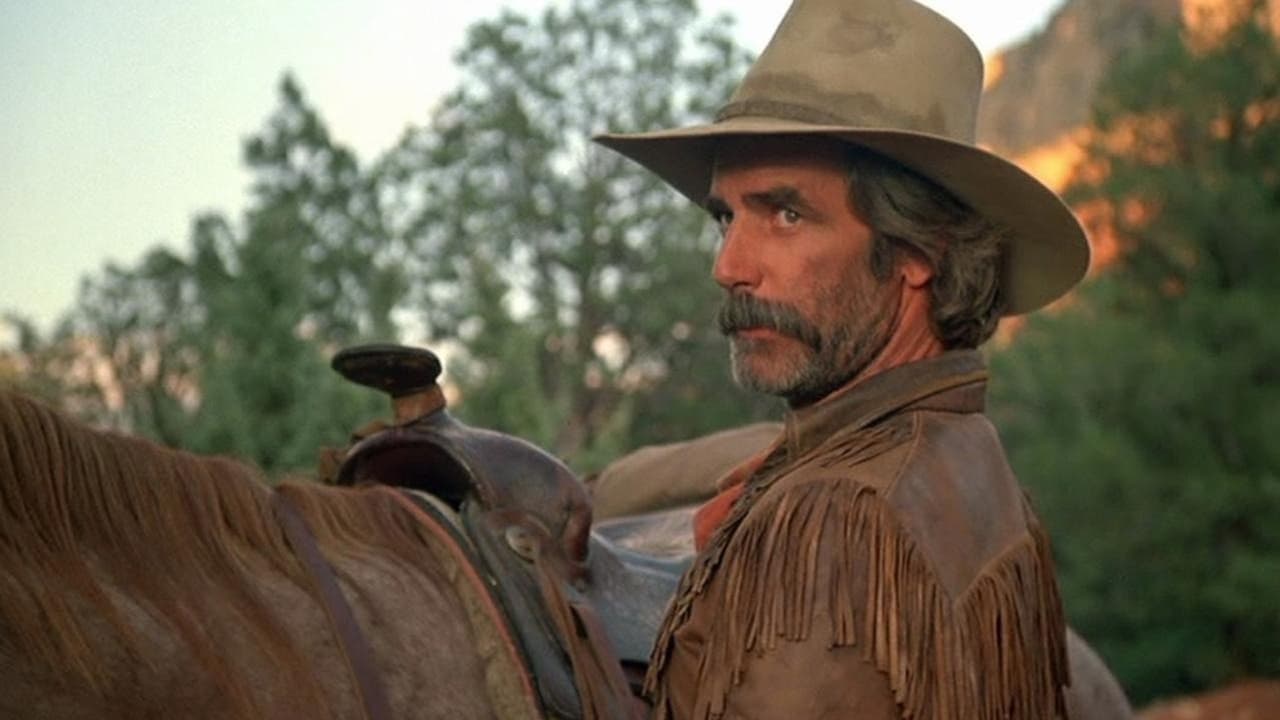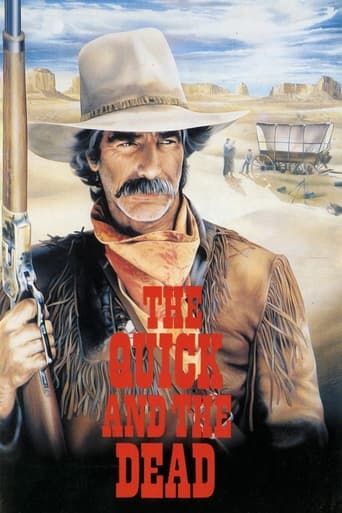NekoHomey
Purely Joyful Movie!
Acensbart
Excellent but underrated film
Freaktana
A Major Disappointment
Glucedee
It's hard to see any effort in the film. There's no comedy to speak of, no real drama and, worst of all.
Robert J. Maxwell
Impressive location shooting in northern Arizona helps this rather worn plot along, and so does the acting.Tom Conti, ex teacher and ex Civil War sergeant, his wife Kate Capshaw, and their little boy Kenny Morrison, pull up stakes back east and head out West where a man and his family can escape the violence of the Civil War and breathe the fresh, clean, anarchic air.They offend one of those crusty, villainous families that are so often offended in these Westerns -- "Shane," "Will Penny," the Clantons -- and Conti and family are pursued by these revenge-driven miscreants over snowy hill and grassy dale.Well, I'll tell you. They don't know nothing' about survival in the West. Their hides are saved only by the appearance of Sam Elliott in buckskin and leather, toting a repeating rifle and various other gear. Elliott guides them through the wilderness towards the rude log cabin, miles away, that they will some day call home. But, of course, not if the evil family has anything to say about it.Time and again, the pursuers and the pursued wound one another but each carries on, leaving a trail of blood. The pursuers actually are winnowed down. One by one, they are plugged, except for the youngest, who sensibly decides to hell with it and rides off alone towards home. The rest of the pursuers don't fare so well.The plot line really is hoary. A pioneer family are unprepared for the violence they encounter and are saved by a romantic, sun-tanned stranger. The family's wife is attracted towards the mysterious savior and vice versa. "Mrs. McKaskel, if you wasn't married I'd of chased you till you dropped," says Sam Elliott, by way of declaring his deep affection for her. Mrs. McKaskel's pretty pale-blue eyes glow with pleasure.The acting is professional enough. Nobody can complain. Sam Elliott is his usual laconic, masculine self. He has a habit of holding conversations while facing at a right angle to the other, which gives him an opportunity to stare over his shoulder at the person he's addressing. Poor Tom Conti is saddled with a face that's about as interesting as a bowl of porridge, a kind of fleshier Dustin Hoffman, and his voice sounds like he suffers from an adenoid condition. He handles the role very well but those attributes knee-cap his performance.Kate Capshaw is quite a fox when you get right down to it but she's usually cast as a properly brought up, middle-class figure, as she is here. Only one film, whose title I can't remember, gave her an opportunity to show a slinkier and sexier side. I was genuinely worried about the family's son. He's about ten or eleven years old. I quailed at the thought of another cuddly kid saying cute things, but this kid can act. It could have been awful. He might have had disabling asthma attacks under stress or something. I shudder at the thought. That I never wanted to stomp him like an insect is a tribute to his talent.I enjoyed the message though. I thought it was carefully considered, thoughtful, and humane. Only Wussies swear off violence. Real men kill.
grizzledgeezer
Sam Elliott tosses a dead antelope in front of Kate Capshaw, then delivers that line with a more or less straight face.Talk about double entendre! It's not the ungulate he's referring to.The main reason for seeing this film is Sam Elliott, one of the sexiest men of the last century. (Why no one did a remake of "The Virginian" with him is beyond my comprehension.) He could be William-Conrad tubby and still be good-looking. Here he's spectacularly thin and angular. I wonder how many hetero men harbor a hankerin' for him.The story is nothing special. All the good people live and the bad people die. The dialog rarely rises above the perfunctory.Westerns are rarely detail-accurate. This one shows something hardly ever seen in Westerns -- a chew stick. After dinner, Elliott chews on one to clean his mouth. On the other hand, one of the bad'uns calls Conti's son a "rug rat", a decidedly late-20th-century term. Capshaw mispronounces "cavalry" but the director doesn't catch it. And I wonder how "Kentucky corn liquor" (which is presumably moonshine) can be brown.Not the worst way to kill 90 minutes -- but hardly a great Western.
weezeralfalfa
Sam Elliott's Con Vallian is the classic wandering western frontiersman loner, who keeps popping up to save one lone traveling immigrant family(McKaskels) from a small gang of vultures(shabby Shabitt, kin and associates), who are intent on extracting vengeance for Vallian's killing of one of them when they are about to murder the man of this family(Duncan) for trying to retrieve the two horses they stole from him. Vallian makes clear periodically through the film his reason for wanting to protect this family from harm. He's mightily attracted to the beautiful, wholesome, Suzanna(Kate Capshaw); Duncan's wife. At one point, he catches her alone in the woods and extracts a passionate kiss from the ambivalent Susanna. Although Vallian saves their lives from the Shabitt gang several times, and they help save his life after he is wounded by this gang, Duncan sometimes wishes he would get lost, correctly suspecting he's trying to steal his wife's heart, and fed up with Vallian constantly giving them advice on what to do next, and criticizing Duncan's reluctance to use a firearm. Eventually, they become somewhat more comfortable with each other, after Suzanna assures Duncan that she is not tempted to have an affair with Vallian. It's clear during their parting conversation that Vallian still enjoys the strong admiration of Suzanna, if not her physical intimacy.Vallian might aspire to replace Duncan in Suzanna's life. However, he makes no effort to hasten Duncan's demise, protecting him as well as her from harm. Besides, he wouldn't be willing to settle down as a sedentary family man, even with a fantasy woman like Suzanna. As he details at the end, he has to feel free to wander as he pleases, living life on the edge each day, with occasional opportunistic female encounters: normally with squaws. Vallian supposedly is a half breed, but certainly doesn't look or act it. On the other hand, the supposed half breed Ute, who serves as tracker for the Shabitts, clearly has lived as a Native American, but is clearly played by a full Caucasian.The McKaskels supposedly left their native Ohio to help forget the horrors Duncan witnessed participating in the Civil War. Well, since this story clearly takes place in 1876, dated by the reported current massacre of Custer's 7th cavalry, including Suzanna's brother, they sure took their time escaping the 'dangerous' East. Another big problem with this explanation is that the Big Horn region of northern Wyoming was still regarded, by treaty, as Native American territory: off limits to European settlement. Thus, historically, the story about Suzanna's brother building them a well made cabin (complete with glass windows!) out in the middle of this 'Indian' territory isn't plausible. The NAs would have burned it down, as they had the forts built in this region 10 years earlier. As demonstrated by the 7th cavalry fate, if they were looking for a peaceful hideaway, the Big Horn region wasn't it at this time! The concurrent influx of gold seekers into the Black Hills, to the east of this region, was stirring up renewed conflict between Europeans and NAs in this general region.The 'reluctant buddy' plot device used here is quite common in westerns and comedies. It tends to provide a more interesting screen play than films that feature a pair well attuned to each other..... The feature of a small group of nasty 'hyenas' pursuing a moving target for revenge or profit or both has also been rather common in westerns. Examples from the period of classic Hollywood westerns include : "Wagon Master", "The Cowboys", "Will Penny", "Along the Great Divide", "Ride Lonesome" and "Ride the High Country". Often a sexual encounter with a woman included in the victim party is part of what they want and, often, as in the present case, the woman is forced to learn to use a firearm effectively to help defend herself.The location shooting in northern Arizona provides a scenic surrounds, with varied topography , from red cliffs and spires, to desert vegetation, to thin woods, and sometimes with snow-capped mountains in the background. This is a significant plus for me.
senorchiste
I'm a western fan and a Sam Elliott fan, so this should have been right up my alley, but I felt the film fell drastically short. The story had potential, but the writers of this film made some questionable choices in dialog. Also, I feel that the director should have demanded more of his actors, especially those playing Mr. McKaskel and his son. Their dialog in particular seemed stilted most of the time. In addition, there are several cuts that seem off-timing and distract from the story. However, Sam did do a good job, and had his supporting cast's talents been brought out better and exhibited more, I feel that the movie would have been much more enjoyable

